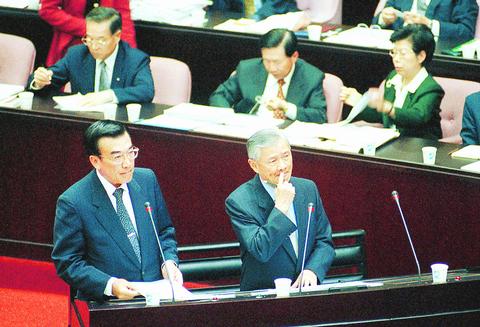Premier Tang Fei (
Anti-nuclear legislators and legal experts, however, said the legal basis to terminate the project lay in the Constitution, which takes precedence over the Budget Law.
Controversy over the legal basis to terminate the power plant project was stirred on Monday when Lin Chuan (

PHOTO: CHEN CHENG-CHANG, TAIPEI TIMES
According to the article, the government may only stop drawing on a budget in the case of a national emergency. Whether the condition applies to the power plant case, however, is uncertain.
Lin's opinion was echoed yesterday by KMT officials, who are in favor of nuclear energy.
Answering legislators' questions, Premier Tang said yesterday that the Ministry of Economic Affairs was reviewing the final recommendation made by its Fourth Nuclear Power Plant Re-evaluation Committee (
"No matter what suggestions are made by the Executive Yuan, they are only to give the DPP more information," said Tang, adding that the future of the plant would still be decided in accordance with the law.
Meanwhile, law professors urged yesterday that officials and legislators consider the issue based on both Article 70 of the Constitution, as well as Interpretation No. 391 of the Council of Grand Justices.
"The Executive Yuan will not break the law at all if it fails to execute an approved budget," said Chen Tzu-yang (陳慈陽), a law professor at National Taipei University, at a public forum held at the Legislative Yuan.
Taking the power plant project as an example, Chen said that all the Executive Yuan had to do was to give reasons for not executing the budget. Simply, the Executive Yuan has to explain how the original purpose of building the power plant -- to provide the public with sufficient power -- will be achieved by others means.
Anti-nuclear legislators said yesterday that the project had become a pawn in a political struggle.
"I regret the actions of some who stressed that there was no legal basis for halting the project," said KMT Legislator Jao Yung-ching (
"They should have respected the suggestions of experts in the economic affairs ministry's task force for a review of the project," Jao said.
New Party legislator Hsieh Chi-ta (謝啟大) said the New Party was producing a pamphlet against the nuke project, which gives reasons from a variety of perspectives, ranging from law, economics and energy, to sustainable development.
The KMT, on the other hand, revealed yesterday the results of a survey on the public's attitude toward the project. KMT officials said that 55 percent of interviewees supported continuation of the project. In addition, KMT officials said, 55 percent of interviewees would not welcome higher electricity prices caused by the halt of the project.
The survey questioned 1,097 residents over the age of 20 in 24 administrative districts.

MAKING WAVES: China’s maritime militia could become a nontraditional threat in war, clogging up shipping lanes to prevent US or Japanese intervention, a report said About 1,900 Chinese ships flying flags of convenience and fishing vessels that participated in China’s military exercises around Taiwan last month and in January last year have been listed for monitoring, Coast Guard Administration (CGA) Deputy Director-General Hsieh Ching-chin (謝慶欽) said yesterday. Following amendments to the Commercial Port Act (商港法) and the Law of Ships (船舶法) last month, the CGA can designate possible berthing areas or deny ports of call for vessels suspected of loitering around areas where undersea cables can be accessed, Oceans Affairs Council Minister Kuan Bi-ling (管碧玲) said. The list of suspected ships, originally 300, had risen to about

DAREDEVIL: Honnold said it had always been a dream of his to climb Taipei 101, while a Netflix producer said the skyscraper was ‘a real icon of this country’ US climber Alex Honnold yesterday took on Taiwan’s tallest building, becoming the first person to scale Taipei 101 without a rope, harness or safety net. Hundreds of spectators gathered at the base of the 101-story skyscraper to watch Honnold, 40, embark on his daredevil feat, which was also broadcast live on Netflix. Dressed in a red T-shirt and yellow custom-made climbing shoes, Honnold swiftly moved up the southeast face of the glass and steel building. At one point, he stepped onto a platform midway up to wave down at fans and onlookers who were taking photos. People watching from inside

Japan’s strategic alliance with the US would collapse if Tokyo were to turn away from a conflict in Taiwan, Japanese Prime Minister Sanae Takaichi said yesterday, but distanced herself from previous comments that suggested a possible military response in such an event. Takaichi expressed her latest views on a nationally broadcast TV program late on Monday, where an opposition party leader criticized her for igniting tensions with China with the earlier remarks. Ties between Japan and China have sunk to the worst level in years after Takaichi said in November that a hypothetical Chinese attack on Taiwan could bring about a Japanese

STREAMLINED: The dedicated funding would allow the US to transfer equipment to Taiwan when needed and order upgraded replacements for stockpiles, a source said The US House of Representatives on Thursday passed a defense appropriations bill totaling US$838.7 billion, of which US$1 billion is to be allocated to reinforcing security cooperation with Taiwan and US$150 million to replace defense articles provided to the nation. These are part of the Consolidated Appropriation Act, which the US House yesterday passed with 341 votes in favor and 88 against. The act must be passed by the US Senate before Friday next week to avoid another government shutdown. The US House Committee on Appropriations on Monday unveiled the act, saying that it allocates US$1 billion for the Taiwan Security Cooperation Initiative